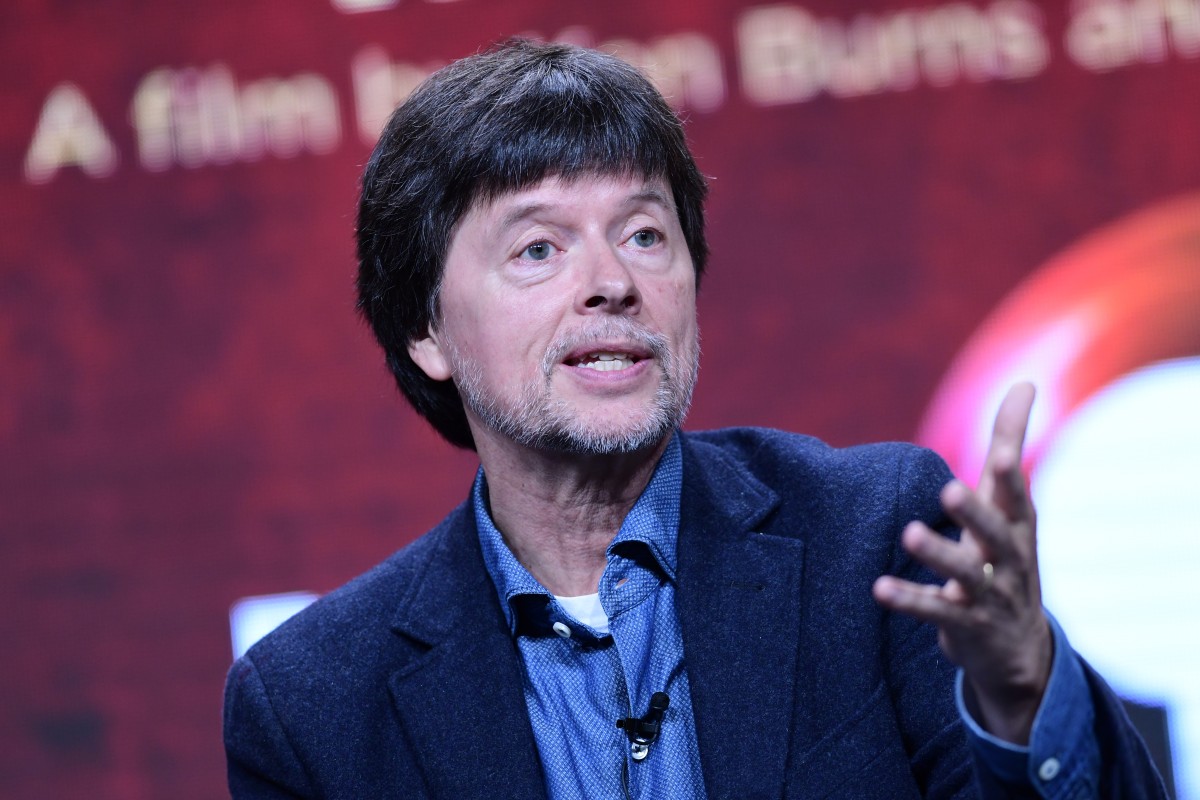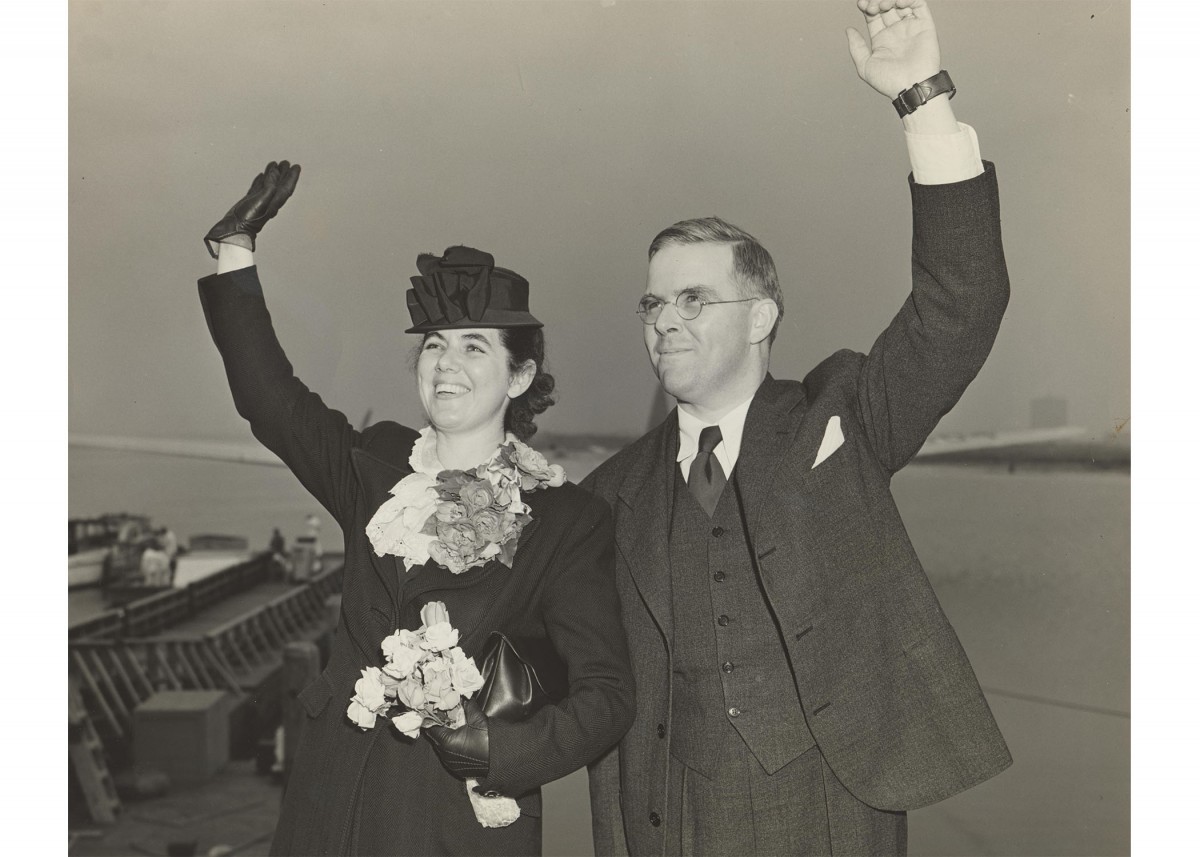Ken Burns Talks Donald Trump, Refugees, and Defying the Nazis: The Sharps’ War

Photo by Rahoul Ghose / PBS
As the world continues to deal with the Syrian refugee crisis, Ken Burns’s new documentary Defying the Nazis: The Sharps’ War couldn’t be coming out at a more perfect time. The film, which debuts on PBS Tuesday night, centers around Waitstill and Martha Sharp, a Wellesley couple who risked everything to help endangered refugees flee from Europe during World War II.
Defying the Nazis is a bit of a first for Burns, as he didn’t have to do any of the shooting or interviewing since the project was originally the brainchild of Artemis Joukowsky, the grandson of Waitstill and Martha. After seeing a rough cut of the movie, Burns slowly took on more of a role in the film, first as an adviser before eventually becoming a co-director opposite Joukowsky.
Burns admits that the movie is “Artemis’s baby,” but adds that he was happy to help out in a larger capacity with the editing process and in other areas, like getting Tom Hanks on board to voice Waitstill.
“I’ve probably looked at this film more than any other film I’ve worked on,” Burns says.
Ahead, the legendary filmmaker opens up about why he decided to sign on to Defying the Nazis, what the movie says about today’s refugee crisis, and clarifies his comments on Donald Trump.
What was it exactly about the Sharps and their story that drew you to this project?
It’s a heart-pounding, kind of espionage story. Here you have a Unitarian minister and his wife living a comfortable, middle class life in Wellesley, Massachusetts, and all of a sudden, she’s dodging Gestapo agents on her trail and he’s going from European capital to European capital laundering money. Both of them have these amazing escapes where, at any time, everything could’ve ended and their lives would’ve been over. We would’ve just heard that some Americans perished in a concentration camp some place. But they didn’t, so it operates on that level, which is just amazing. Then it operates as a story of just human beings sacrificing for other human beings, making an effort to save other human lives, which, particularly today when we have this critical refugee crisis, must in some ways be echoes of the past, must rhyme in today’s moments. And, of course, the individual stories. Not just the Sharps and what they gave up in order to do this, but also the stories of the refugees.

Photo by Sharp Family Archives
The journey of the Sharps comes across as both a dramatic war story as well as a tragic tale about love and the toll their work took on their relationship.
This is, at the end of the day, an existential story. Throughout it the Sharps, particularly Martha, says, “Well anybody would have done this.” Of course, that’s just not true. It throws the question back on you. Would I do it? Could I do this sort of thing? Could I help my fellow human beings in this way. It’s a story about sacrifice, but it’s also a story about the cost of sacrifice. They may have risked their lives, but they also placed their family and their marriage in jeopardy at the same time.
Considering the current refugee crisis, are there any lessons from the film that can be applied to today’s situation?
That’s something for each viewer to decide because this is all about conscious and what you do. I think this story throws us back onto ourselves. But having said that, we’re just telling this story. We’re not interested in pointing arrows, saying, “Is this like today?” We do know, as filmmakers, that from the Old Testament or the Jewish Torah that Ecclesiastes says, “What has been will be again. What has been done will be done again. There’s nothing new under the sun.” So if you tell an historical story well, there’s probably a really good chance it resonates in the present. Mark Twain is supposed to have said, “History doesn’t repeat itself, but it rhymes.” If he did in fact say that, it’s a wonderful statement and I’ve spent my entire professional life, almost 40 years, trying to hear those verses, trying to hear those rhymes.
Although you’ve been critical of people like Donald Trump, you’ve said you have no interest in being a political filmmaker or taking sides on issues with your work. Is it, at the very least, satisfying to know that your films do contribute in some way to conversations around huge and important topics like the refugee crisis?
Here’s the thing, politics is pretty superficial. It’s very binary. Yes and no, that’s what it is. Right and wrong. We know that life is much more complicated than that. When yes and no or right and wrong get amplified, people don’t speak with each other they speak to each other and end up shouting. What I feel most satisfied about is that by taking a long view, taking an historical look, that I’m very pleased to see that it’s possible for us to have a civil discourse. History is still something we all share, regardless of who we’re voting for. I, not at all connected to my work, as a private citizen spoke for one quarter of a commencement address I gave at Stanford University more than two months ago without mentioning Donald Trump’s name and criticized what I felt were the baser instincts that he was appealing to and his lack of qualification to run for national office. That was it. I went back the next day literally to working on my project and not thinking about that. The world ran with that.
I’m more interested when attendance at Civil War battle sites go up 200-300 percent. I’m interested when people get off their couch by the millions and start visiting national parks. I’m interested when people can use the film on Jackie Robinson or Jack Johnson, a decade earlier, or other films like Jazz to talk about race in a civil matter. That we can have a civil discourse. I think a lot of advocacy, political films now have their moment, their supernova. They burn brightly in the moment and then they disappear. What I am happy with is our films come in and, they may not be sexy, but they end up spawning conversations for decades instead of for days. That’s important to me.
‘Defying the Nazis: The Sharps’ War’ premieres on PBS Tuesday at 9 p.m.
This interview has been edited and condensed.


